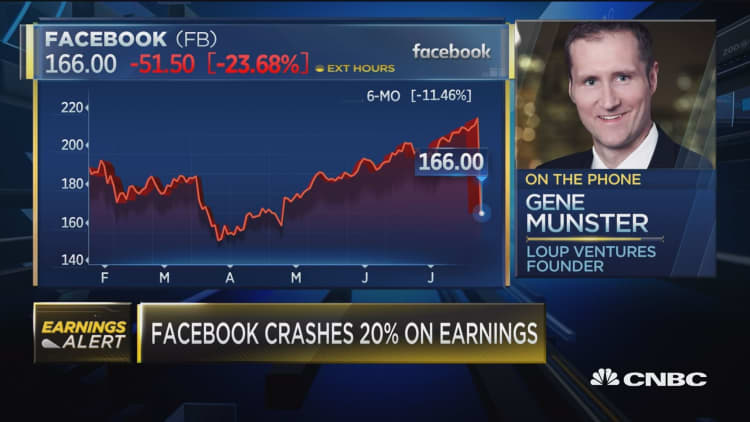Facebook's stock was already down around 8 percent after reporting second quarter earnings that missed revenue and user growth expectations.
Then the company's executives kicked off the earnings call with analysts.
By the end of the call, the stock had plunged as much as 25 percent before settling with a drop of 20 percent, wiping more than $120 billion off the company's market value.
Several comments spooked investors, but the big one was a concrete prediction from CFO David Wehner that operating margins would decline to the "mid-30s" as the company broadened its markets, invested in new products and poured money into safety and security improvements. Those moves are expensive but the company sees them as important for the long-term health of the platform.
Execs also warned that Facebook's revenue growth rates will decline in the "high single digits" during the second half of the year.
This isn't the first time Facebook's stock has moved dramatically following executive statements on an earnings call. In contrast with most earnings calls, which are dull and have no impact on the share price, Facebook's tend to contain actual information, often geared toward curbing investor enthusiasm.
Some examples:
- Q2 2016: The company's shares rose as much as 8 percent after hours on revenue growth that accelerated faster than analysts had been expecting. On the call, Wehner then warned investors that Facebook was maxing out its "ad load," or the number of ads it could cram into the Facebook News Feed, and that growth in that area would taper. That shaved a couple percentage points off the gain.
- Q3 2016: The stock tumbled as much as 8 percent during the call when Wehner reiterated that ad load growth would taper in the second half of 2017, and that Facebook expected "aggressive" increases in spending for the year.
- Q3 2017: The stock initially rose on the earnings report, then fell more than 2 percent during the earnings call, after CEO Mark Zuckerberg warned that he was serious about investing in safety and security of the platform, at the expense of profitability.
The trend was reversed in the fourth quarter of 2017, however.
Facebook's stock tanked when the earnings press release noted that the company had shown fewer viral videos, reducing the amount of time people spent on the site by an average of 50 million hours a day. During the call, executives said that the average price per ad increased 43 percent, suggesting that Facebook's pricing power remained strong because advertisers had few places to turn. The stock price whipsawed back into positive territory.



